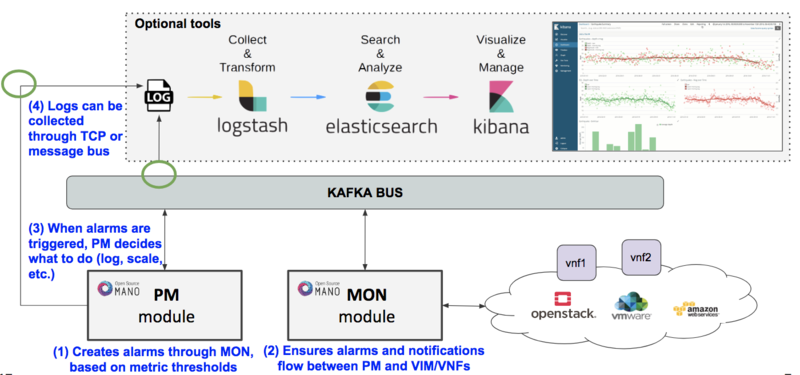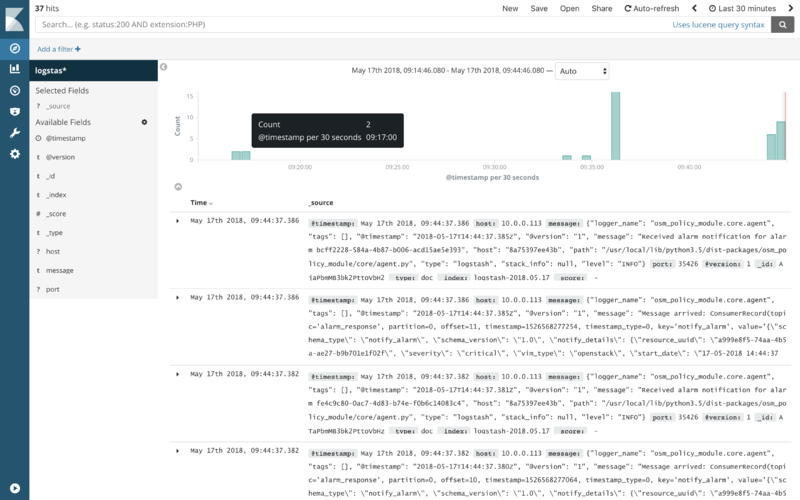OSM Fault Management: Difference between revisions
(note about metrics granularity) |
mNo edit summary |
||
| Line 1: | Line 1: | ||
This | This documentation corresponds now to Release FIVE, previous documentation related to Fault Management has been deprecated | ||
==Basic functionality== | ==Basic functionality== | ||
=== Logs & Events === | === Logs & Events === | ||
As of Release | As of Release 5.0.0, logs can be monitored on a per-container basis via command line, like this: | ||
docker logs <container id or name> | docker logs <container id or name> | ||
For example: | |||
docker logs osm_lcm.1.tkb8yr6v762d28ird0edkunlv | |||
Furthermore, there are some important events flowing between components through the Kafka bus, which can be monitored on a per-topic basis by external tools. | |||
=== Alarm Manager for Metrics === | |||
As of Release FIVE, MON includes a new module called 'mon-evaluator'. The only use case supported today by this module is the configuration of alarms and evaluation of thresholds related to metrics, for the Policy Manager module (POL) to take actions such as [OSM_Autoscaling auto-scaling]. | |||
Whenever an alarm is triggered, the notification is | Whenever an alarm is triggered, the notification is generated by MON and put in the Kafka bus so other components can consume them. | ||
By default, threshold evaluation occurs every 30 seconds. This value can be changed by setting an evnironment variable, for example: | |||
docker service update --env-add OSMMON_EVALUATOR_INTERVAL=15 osm_mon | |||
docker service update --env-add | |||
==Experimental functionality== | ==Experimental functionality== | ||
Revision as of 00:15, 4 December 2018
This documentation corresponds now to Release FIVE, previous documentation related to Fault Management has been deprecated
Basic functionality
Logs & Events
As of Release 5.0.0, logs can be monitored on a per-container basis via command line, like this:
docker logs <container id or name>
For example:
docker logs osm_lcm.1.tkb8yr6v762d28ird0edkunlv
Furthermore, there are some important events flowing between components through the Kafka bus, which can be monitored on a per-topic basis by external tools.
Alarm Manager for Metrics
As of Release FIVE, MON includes a new module called 'mon-evaluator'. The only use case supported today by this module is the configuration of alarms and evaluation of thresholds related to metrics, for the Policy Manager module (POL) to take actions such as [OSM_Autoscaling auto-scaling].
Whenever an alarm is triggered, the notification is generated by MON and put in the Kafka bus so other components can consume them.
By default, threshold evaluation occurs every 30 seconds. This value can be changed by setting an evnironment variable, for example:
docker service update --env-add OSMMON_EVALUATOR_INTERVAL=15 osm_mon
Experimental functionality
Some extensions have been added to the OSM installer to include an optional 'OSM ELK' stack to allow for events visualization, consisting of an ELK stack, with minor configurations that make it able to monitor some kakfa topics and logs.
Basic architecture is as follows:
Enabling the OSM ELK Stack
If you want to install OSM along with the ELK stack, run the installer as follows:
./install_osm.sh --elk_stack
If you just want to add the ELK stack to an existing OSM R4 Lightweight build, run the installer as follows:
./install_osm.sh -o elk_stack
This will install three additional docker containers (Elasticsearch, Logstash and Kibana)
If you need to remove it at some point in time, just run the following command:
docker stack rm osm_elk
If you need to deploy the stack again after being removed:
docker stack deploy -c /etc/osm/docker/osm_elk/docker-compose.yml osm_elk
Testing the OSM ELK Stack
By default, the available ELK Stack monitors the 'alarm_response' Kafka topic, and any log sent to TCP port 5000.
1. Visit Kibana frontend at http://1.2.3.4:5601, replacing 1.2.3.4 with the IP address of your host.
- Note: during installation, the script tries to add a 'default pattern' which the ELK system needs to match which logs to present from Logstash. If you hit 'Discover' and Kibana still asks you to create a default index pattern, just paste the following script in your OSM host:
curl -f -XPOST -H "Content-Type: application/json" -H "kbn-xsrf: anything" \
"http://localhost:5601/api/saved_objects/index-pattern/logstash-*" \
-d"{\"attributes\":{\"title\":\"logstash-*\",\"timeFieldName\":\"@timestamp\"}}"
curl -XPOST -H "Content-Type: application/json" -H "kbn-xsrf: anything" \
"http://localhost:5601/api/kibana/settings/defaultIndex" \
-d"{\"value\":\"logstash-*\"}"
2. Create an alarm following the example above and you will see an event appear at the histogram. This event came from the 'alarm_response' topic.
3. Trigger a VDU alarm (with CPU spikes or any other mechanism), and you will see a notification arrive at Kibana. This event came from the 'alarm_response' topic as well.
4. Configure the Policy Manager component to log events to Logstash through port TCP 5000, and repeat (3), you will see further details whenever an alarm is triggered.
docker service update --env-add LOGSTASH_URI=logstash:5000 osm_pm
In the near future, more components will have visibility through Kibana.
Your feedback is most welcome! You can send us your comments and questions to OSM_TECH@list.etsi.org Or join the OpenSourceMANO Slack Workplace See hereafter some best practices to report issues on OSM

